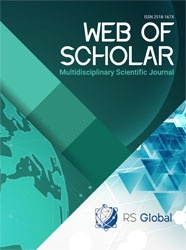СУБ`ЄКТИВНЕ НАЧАЛО ЯК ОРГАНІЗУЮЧИЙ ЦЕНТР ЛИСТУВАННЯ РОМАНТИКІВ
Abstract
The article reveals epistolary collections of romanticists. It is established, that the subjective origin is an organizational principle in romanticists’ mail communication. Absolutizing a human being, an individual, romanticists demonstrated stronger interest to their inner being and eagerness to master the deepness of their spirit. Herewith artistic romanticists’ discoveries connected to mastering spiritual essence were done by them not only in the process of observing their contemporaries but also by dipping into their inner world, in particular in the epistolary artistic process that is witnessed with the analyzes of mail communication creations. Romanticists’ mail communication either European or Ukrainian in particular are full of courageous psychological analyzes, reflection and self-dipping. They foresee limiting «uncovering» of addresser’s soul and heart. These letters are characterized by typical romantic topics that let know about them in romanticists’ artistic heritage which pays its attention to limiting person’s states.
References
Бовсунівська Т.В. Історія української естетики першої половини ХІХ століття. Київ: Видавничий дім Дмитра Бураго, 2001. 344 с.
Боровиковський Л.І. Повне зібрання творів. Київ: Наукова думка, 1967. 280 с.
Ботникова А.Б. Немецкий романтизм: диалог художественных форм. Воронеж: Воронежский государственный университет, 2003. 341 с.
Гайм Р. Романтическая школа. Вклад в историю немецкого ума. СПб.: Наука, 2007. 893 с.
Гребінка Є.П. Твори в 3-х томах. Том 3. Київ: Наукова думка, 1981. 703 с.
Елистратова А. А. Эпистолярная проза романтиков. Европейский романтизм. Москва: Наука, 1973. С.309–351.
Кузьменко В. І. У всесвіті слова: літературно-критичні студії. Київ: Друге дихання, 2018. 684 с.
Максимович М. Листи. Київ: Либідь, 2004. 312 с.
Шамрай А.П. Харківська школа романтиків: у 3 т. Харків: ДВУ, 1930. Т. 2. 224 с.
Шлегель Ф. Эстетика. Философия. Критика: В 2-х томах. Москва: Искусство, 1983. Т. 2. 448 с.
Views:
336
Downloads:
259
Copyright (c) 2019 The author

This work is licensed under a Creative Commons Attribution 4.0 International License.
All articles are published in open-access and licensed under a Creative Commons Attribution 4.0 International License (CC BY 4.0). Hence, authors retain copyright to the content of the articles.
CC BY 4.0 License allows content to be copied, adapted, displayed, distributed, re-published or otherwise re-used for any purpose including for adaptation and commercial use provided the content is attributed.











